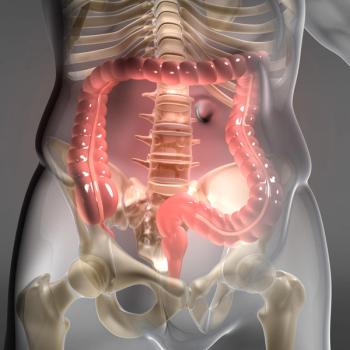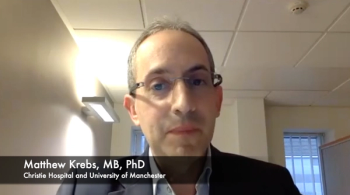
At the time of analysis, the median progression-free survival was not reached with fruquintinib plus capecitabine in a phase 1/2 trial.

Your AI-Trained Oncology Knowledge Connection!


At the time of analysis, the median progression-free survival was not reached with fruquintinib plus capecitabine in a phase 1/2 trial.

Ongoing ctDNA analysis may elucidate outcomes associated with divarasib plus migoprotafib for those with KRAS G12C–positive NSCLC.

Preliminary results from a phase 1 trial show an objective response rate of 13.3% with avutometinib, abemaciclib, and fulvestrant in CDK4/6 inhibitor–resistant HR+/HER2– metastatic breast cancer.

Event-free survival events were observed in 37.5% of patients with resectable locally advanced HNSCC who took pembrolizumab vs 45.3% in those who did not.

A phase 2 study found a complete clinical response of 82% with neoadjuvant dostarlimab in dMMR solid tumors.

The combination of nurulimab plus prolgolimab enhanced PFS, ORR, and DCR compared with prolgolimab monotherapy in unresectable or metastatic melanoma.

No grade 3/4 treatment-related adverse effects were observed in patients receiving efbemalenograstim alfa for breast cancer in the Guard-02 trial.

![“These findings highlight the critical need to address PEM in the management of [patients with multiple myeloma] with ACHF to mitigate the associated poor clinical outcomes,” according to the study authors.](https://cdn.sanity.io/images/0vv8moc6/cancernetwork/4de1e119837b011168a7884a19a600b14bb6a258-3600x2400.jpg?w=350&fit=crop&auto=format)
Findings indicate a need to address protein-energy malnutrition in the treatment of those who have multiple myeloma with acute congestive heart failure.

Sacituzumab tirumotecan elicited responses prominently in the second- and third-line and beyond setting and in those with high TROP2 expression.

HR001 was found to have an efficacious response for patients with relapsed/refractory non-Hodgkin lymphoma.

A proteogenomic analysis found savolitinib plus osimertinib elicited a response in patients with EGFR-mutated, MET-amplified advanced NSCLC.

Investigators also look to assess linvoseltamab in relapsed/refractory multiple myeloma as part of the phase 3 LINKER-MM3 trial.

First-in-patient findings support AZD1390 as a potential radiosensitizer during the management of glioblastoma.

Data from the phase 1/2 KRYSTAL-1 trial may support adagrasib plus cetuximab as a new standard in previously treated metastatic KRAS G12C–mutated CRC.

The liquid biopsy combining miRNA and CA19-9 had the best validation rates for detecting pancreatic ductal adenocarcinoma.

Patients with advanced solid tumors may be able to stay on treatment with saruparib longer compared with other approved PARP inhibitors, thereby improving efficacy.

Matthew Krebs, MB, PhD, spoke about how subcutaneous amivantamab can best be utilized in future clinical trials.

Matthew Krebs, MB, PhD spoke about efficacy of subcutaneous amivantamab observed in the phase 1 PALOMA trial for patients with solid tumors.

Stéphane Champiat, MD, PhD, spoke about the reasoning behind using the IL-2/IL-15 superagonist SOT101 and where the research is heading for patients with solid tumors.

Although canakinumab, pembrolizumab, and chemotherapy did not lead to an improvement in survival vs the placebo cohort, it may still have benefit in certain subgroups of patients with previously untreated locally advanced or metastatic non–small cell lung cancer.

Data from the phase 2 KGOG 3046 trial revealed evidence of antitumor activity with the neoadjuvant chemoimmunotherapy regimen containing durvalumab and tremelimumab for patients with advanced-stage ovarian cancer.

Matthew Krebs, MB, PhD spoke about the reasoning for the phase 1 PALOMA trial in patients with solid tumors who received a subcutaneous formulation of amivantamab.

Results of the phase 2 AURELIO-03 trial show SOT101 plus PD-1 inhibition induced responses in patients with advanced solid tumors.

A phase 3 trial of patients with extensive-stage small cell lung cancer who were treated with adebrelimab plus chemotherapy compared with matched placebo met the primary end point of overall survival.

The addition of an immune checkpoint inhibitor to CG0070 induced a complete response rate of 88.9% among 18 patients in the phase 2 CORE1 trial.

The combination of sotigalimab plus pembrolizumab was associated with a tolerable safety profile in patients with unresectable stage III or IV metastatic melanoma.

Patients with advanced melanoma receiving nivolumab plus ipilimumab in the second-line setting had significant improvement in progression-free survival.

Novel BO-112 when combined with pembrolizumab may offer a new treatment option for patients with advanced melanoma and PD-1 inhibitor therapy resistance.

Stéphane Champiat, MD, PhD, spoke about the results of the AURELIO-03 trial with SOT101 and pembrolizumab for patients with advanced solid tumors.